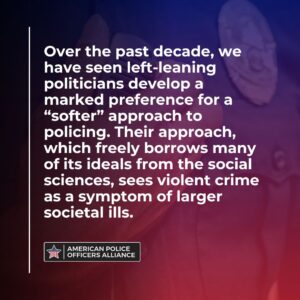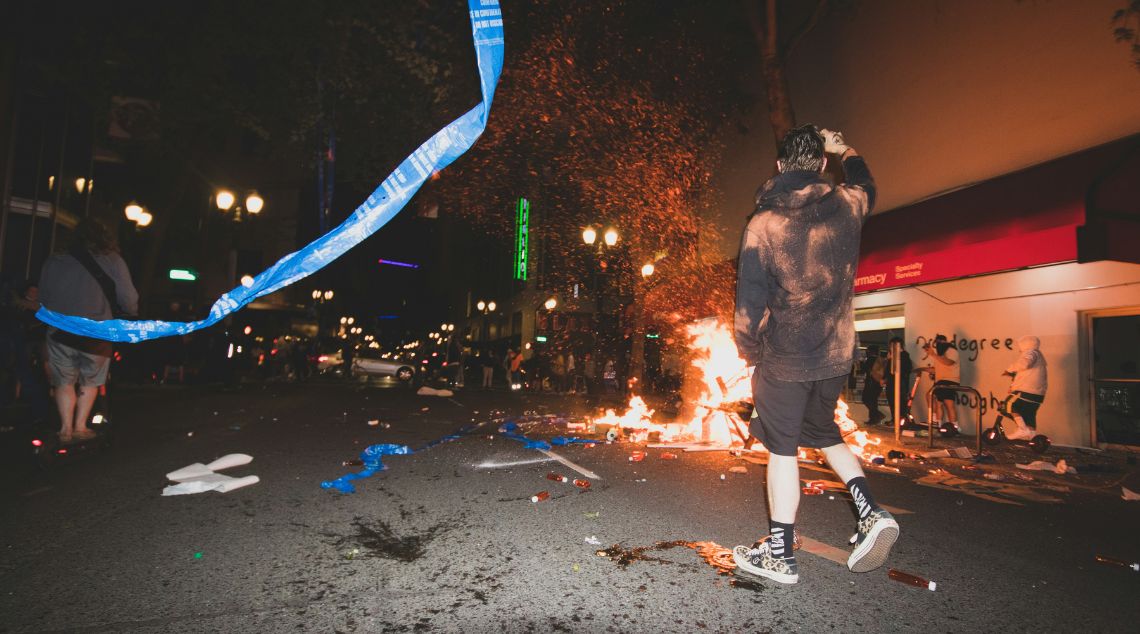Between the 1990s and the turn of the millennium, murder rates across the country fell predictably and steadily. However, the past ten years have marked the end of this trend – with many cities seeing stagnant crime rates and even new spikes.
The situation has been particularly dire in the large, coastal cities – the ones that traditionally vote for the blue party and where people traditionally distrust their boys in blue. At first glance, this is puzzling – these are also often the richest cities, with broad social services and fast-paced job markets.
Is it a matter of lack of cooperation? Funding? Or is there a deeper political phenomenon at the root? Let’s examine what public policy experts and police advocates have to say about the ongoing public safety crisis in liberal cities.
The “Liberal” Approach to Policing
Over the past decade, we have seen left-leaning politicians develop a marked preference for a “softer” approach to policing. Their approach, which freely borrows many of its ideals from the social sciences, sees violent crime as a symptom of larger societal ills.
Superficially, this makes sense: many petty thieves and robbers are initially spurred by a lack of financial opportunities and plain need. However, the solutions offered by this ideology completely ignore that many crimes are crimes of opportunity and happen simply because there is nobody around to enforce law and order.
Since the advent of the first “Black Lives Matter” protests, this naivete mixed dangerously with more hostility towards law enforcement officers. Rather than part of a necessary force, the newer cadres of political ideologies see police officers as abusers rather than defenders of the abused.
How does such an ideology drive public safety?
In practice, the ideals described above turned into the following policies:
- Many jurisdictions removed funds from Police Departments and reallocated them to welfare subsidies and cash aid.
- Progressively stricter protocols limit the use of force by police officers, even when they’re being directly attacked.
- Shorter jail sentences for those convicted of a crime
- Easier and cheaper bail procedures for those suspected of a crime
- Increasingly draconian restrictions for law-abiding citizens who wish to carry weapons
- Fewer salaries and benefits for police officers and emergency responders, even in high-cost-of-living areas.
But how does it look in reality?

Many of the policies listed above were born from a place of altruism. However, once they become real-world policies, their effect is simple: they make it easier for criminals to get away with their deeds, and they make it harder for police officers to stop them.
Many of the cities that have implemented these policies are now dealing with unprecedented levels of violence.
In Washington, D.C., crime has increased by 39% over the past year. In addition, a “carjacking epidemic” has taken over the city, affecting residents from every income level – including a Democratic Representative, who became a victim of his own ideology,
On the other end of the country, Portland and San Francisco have become prime examples of crime policies gone wrong.
Just 10 years ago, Portland saw unprecedented growth, as its liberal policies and easy lifestyle attracted young people from around the country. Now, it struggles to fill vacant law enforcement positions with a crime surge that began in 2020. As a result, in 2022, the city’s population diminished for the first time since 1987.
Meanwhile, in San Francisco, poor staffing in police departments, the abundance of street drugs, and images of human feces lining the sidewalks have tarnished the image of what was once a shining tourist hotspot.
In all these cases, voters and businesses alike are unhappy with the results. But will this be enough to turn the ballots for the next election?
A Possible Game-Changer for Next Election
According to some pollsters, it might. Nowadays, even traditionally liberal voices are beginning to acknowledge that their recipe doesn’t work. Recently, the New York Times admitted that voters are now largely against “scaling down” or “defunding” the police – even in progressive strongholds such as Seattle or Minneapolis.
After years of rising tensions, the political apology may be too little too late for police officers. Between 2022 and 2023, the issue of citizen safety was prominently discussed during local elections. In cities like Atlanta, it may have even defined the results.
But perhaps this shouldn’t have been a partisan issue in the first place. We have decades of research to back very simple, tried-and-true strategies. Fighting crime requires well-staffed police departments, where officers feel they have the population’s support when things turn ugly. It requires equipment and resources to act rapidly when innocents are in danger. And it needs to abandon the dogma that “crime is okay.”
Image Credit: Photo by Tito Texidor III on Unsplash









